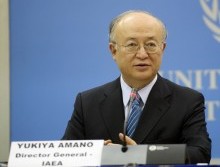Efforts to form an agreement aimed at resolving inspection concerns for Iran’s nuclear program were set back last week, as Iran failed to move forward on the document with the International Atomic Energy Agency (IAEA). An official for the United Nations’ nuclear watchdog said on Friday there “has been no progress” on the arrangement between the sides following a meeting earlier that day, with no set date for a follow-up meeting as of Friday.
The structured approach document between Iran and the IAEA is intended to “resolve outstanding issues relating to Iran’s nuclear program,” according to the Agency’s press statement. It is believed that access to a military site suspected of tests applicable to nuclear weapons and access to scientists are among the disputed points that need to be addressed.
IAEA Deputy Director General Herman Nackaerts, in a statement released by the Agency, placed the blame for the inability to make headway squarely on Iran. “The Agency team came to the meeting in a constructive spirit with the desire and intention of finalizing the paper. We presented a revised draft which addressed Iran’s earlier stated concerns,” said Nackaerts.
“However, there has been no progress and, indeed, Iran raised issues that we have already discussed and added new ones. This is disappointing.”
There had been a sense of cautious optimism from the IAEA heading into the meeting, with Agency Director General Yukiya Amano announcing in May they were working on an arrangement for clarifying concerns that should be reached soon.
The unsuccessful meeting between Iran and the IAEA on Friday comes less than two weeks before the world powers are set for round three of negotiations with Iran over the latter’s nuclear program.
Russian Assumptions
Those meetings, set to begin on June 18 in Moscow, will seek to bridge the gaps between Iran and the P5+1—the United States, the United Kingdom, France, Russia, China and Germany. In the first two meetings Iran has been willing to discuss their nuclear program, but no progress has been made towards confidence-building steps that can prepare the way for a more comprehensive agreement between the sides.
Meanwhile, Russia—a key member of the international group and the host for this round of talks—said last week they are working under the assumption Iran is not currently working on nuclear weapons, according to the Russian RIA Novosti news agency.
Russian President Vladimir Putin, in a meeting with Iranian President Mahmoud Ahmadinejad in China, said they have heard Iran’s claims that they are “not working on the development of nuclear weapons,” with Putin noting, “That is our assumption.”
The Russian perspective comes against concerns from the IAEA and others that Iran is making some progress towards nuclear weapons, including possible tests on explosives used for such devices. However, it is generally believed that Iran has not yet begun to put together actual nuclear weapons, despite progress towards that end.
(By Joshua Spurlock, www.themideastupdate.com, June 10, 2012)

